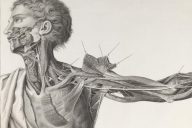“Her: Mona, the girl with pointy front teeth that bore an eerie resemblance to fangs: an artist; an aspiring mortician; an ongoing problem.”
They sit together, but watch alone: the rapturous collision of limbs and a choreographed parry of tongues uncut with music, dangerously free of dialogue, just the sound of bodies’ movements, of the irreducible fact of breath—something so human on screen yet so excruciatingly alien here, in the crowded theater on the corner of Clark and Division in the middle of the hazy fall after they graduated college, a season that seemed to hem them in from all the wrong directions.
Was it he or she who had initially suggested they see Abdellatif Kechiche’s Blue is the Warmest Color–a salacious French movie about hunger and art and sex and hunger? Maybe they’d both wanted to see it. Maybe she wanted to see it for the long, unadulterated sex scene, through which they were sitting now. But maybe Jess wanted to see it because it was French, and because he knew it would remind him of her, before.
Her: Mona, the girl with pointy front teeth that bore an eerie resemblance to fangs: an artist; an aspiring mortician; an ongoing problem; another someone sitting in the theater next to him, experiencing the universally individual shame one can’t help but feel when presented with this sort of public display of intimacy.
They’d met in Aix-en-Provence, a year and a half earlier over their semester abroad, a swath of time he now imbued with the sort of nostalgic pining habitually reserved for childhood—and where was it that he’d seen her first? Perched in the littered hallway of their post-apocalyptic université, sipping on a 50-centime vending machine cappuccino under the flickering hall light?
Strumming an air guitar at the cavernous club that hosted, from time to time, a French band covering American classic rock hits? Hiding behind the lens of an old Canon on the hill leading up to Cezanne’s old workshop, backlit by the corpuscular streetlights in the city center below?
No, it was at the “F” party, the theme of which dictated people come as something that started with the letter “F.” On one of his first nights in Aix, someone from back in Madison who had been there the previous semester had invited him, and so he went, striking out from his apartment and into the labyrinthine streets, vibrating with newness and the muffled, indistinct chatter from outdoor bars and cafes. Buildings keeled over like drunks, forming an abbreviated alcove through which he walked, indefatigably, with the thrilling knowledge that he might get lost. How the navy night befell the pale blue sky, whose clouds billowed and transformed like bedroom smoke climbing the air.
He had mounted the spiral staircase to the nondescript apartment with the red-tile floor, rupturing in jagged, tectonic lines. Someone poured him a Pastis—an anis-flavored liqueur famous to this region of France—which tasted like his grandmother’s favorite chewing gum. Music droned on in the background, mostly American pop songs that inevitably sounded more European, given the context.
Mona first introduced herself as French, glanced askance, poured some wine, lit a cigarette, always moving, gesticulating, shifting. She was barefoot, her toenails painted nude, or else not painted at all. She asked him what he was, and he said, “I’m a Fool.” She said she didn’t understand, and he realized that the word “fool” only started with the letter F in English.
He continued to converse with her in poor French. Tried to appeal to her. He smiled a lot, sheepishly. She intimated that it was endearing. What’s endearing? he’d asked. Your attempts to endear, she said. They went along like this for awhile, until a girl with dead black hair—hair that had the appearance of a wig that had gone through the wash and had been improperly dried—intentionally spilled red wine on someone’s shoulder. Things previously contained upended themselves. Walls shook. The music disassembled talk into unpunctuated babble.
He went to the bathroom then, and when he did, the girl with dead hair followed, locked the door, grabbed his face, looked him in the eye and asked whether he’d rather pee on someone or get peed on. She glared at him with a hollow, rabid stare; her zombied eyes, he swears, had begun to froth. He said he’d rather get peed on, because he had trouble peeing in front of other people. She crossed her arms and said: “I’m waiting.” He tried to leave but she blocked the door. Then they made out for a bit, and her tongue found his mouth and stayed there as if it had nowhere else to go.
When she finally let him pass, he rejoined the party. He remembers seeing Mona, on the balcony, smoking another cigarette. He remembers seeing her lips, so thin that they were almost just skin, or two arrows stripped of direction. Can I bum one, he mumbled, a question to which she responded by just giving him the half-smoked one in her hand and striding inside, perhaps, he considers now, because she believed that that was how the French behaved.
Later that night, meandering back to the hotel in the dark, Mona ran up behind him and pinned herself against a wall. Down the street, he could hear voices lazily entwined with muted jazz. There was a sense, then—and maybe this was just him—that when she pulled him close she was trying to erase all space between them, not in a sexual way, but out of an aesthetic compulsion.
![]()
And the disruptive aria of moans in the crowded theater edging on sacrosanct, the two girls consuming each other with a voracious exigency, while here he sits, inert in his seat. He tries to catch Mona’s eye, even debates reaching for her hand. He wishes he’d bought popcorn. He wonders if there would be a climax, and if there were, whether it would be fake, whether faking an orgasm and acting out an orgasm were the same thing, or whether performance demanded an authenticity faking did not. There was something he’d read, about the physical and emotional demand of the shoot. The masculine gaze of the camera. Something vague regarding feminism. A rant about the artist and his muse, the subversion of that tricky pronoun, “his…”
From behind them, someone whispers: “I can’t,” and walks out of the theater, her truncated phrase lingering in the lacuna the absence of an object created. I can’t what? He wants to finish her sentence, if only to deny the possibility of the myriad things he too cannot do: be really happy; dance well; finish books published pre-1975; pee in front of others; have unprotected sex; admit to himself that maybe he really doesn’t know how to be alone.
![]()
In his apartment in France among the damp clothes strung out like addicts atop windowsills and doorknobs and the backs of chairs, he and a few friends would gather around a small, whitish table with that one hobbled leg to play a game called Truth. Here’s how they played: first, they covered the top of a glass with tissue paper and clasped it down with a rubber band, on the center of which they placed one euro; then someone lit a cigarette; then that person took a drag of the cigarette and poked a hole in the tissue paper with the burning end, and passed the cigarette to the next person in the circle. The first person to poke the hole that forced the euro to fall through the tissue paper would have to truthfully answer a question posed by the rest of the group.
It was just the second or third time he’d hung around with Mona, her presence something of a myth, flickering and fictive. She possessed the rare ability, it seemed, to simply appear when she felt the situation warranted it, and to vanish again when it did not. In the few moments he’d spoken to her since that first night, she would make a concerted effort to avoid eye contact, and then abruptly bear into him; so infrequent were these moments of clarity that he’d begun to consider the possibility that the sum of her intimacies amounted to a calculation. More likely, though, was the prospect that he required some formulaic boundary within which to circumscribe her.
When the cigarette reached Mona for the second time, the tissue paper was riddled with ash-ringed holes, and the euro rested precariously on a narrow peninsula of white. She took an aviary drag and exhaled out of the side of her mouth, then pressed the lit end down onto a relatively isolated area of the circle. The paper caught and the tiny hole she’d created distended until it backed into another, tearing the tendon of tissue and forcing the coin to drop and hit the bottom of the jar with a tinny pang.
But before any of them could respond she squashed the cigarette into one of his makeshift ashtrays, looked him in the eye and proclaimed: “I’m not actually French,” in an alarmingly veritable Brooklyn accent. Although this too was a lie, and maybe the only truth of Truth was that Truth was just a clever excuse to smoke more cigarettes.
After her false confession, Jess and Mona fell into one another in the matter-of-fact way people do in new and exciting cities so full of places be alone. She became, more spirited, even bubbly, in conversation. They held hands; they explored; they lay in public parks and doted affections on one another because it seemed permissible here as it never had in the States. She told him she wanted to be a mortician and he asked why and she said because we might as well get used to it. She told him about her Instagram feed—Selfies of a Vampire—and when he said something deep-sounding about the liminality of existence and post-modern technocracy and the fact that maybe we were all slowly disappearing, she just shrugged and said she found the idea of vampires living in the 21st century to be indescribably sad. They visited Rome and giggled through tours, stood online at art museums but refused to pay 5 Euros to see the David in Florence, and discussed the notion of being on ecstasy at a concentration camp in Berlin, because they were curious about what it would feel like to be coerced into elation and sorrow at the same time.
When the program ended in April, they returned home, then graduated in May and spent the summer looking for apartments in Chicago, wasting time and their parent’s money before both ran out and they would have to find real jobs, start real lives. In the meantime, their childhood dogs were dying and their mothers were drifting into menopause, yet there seemed to be a timelessness to it all, a feeling that because there was no checkpoint left to head towards they could not move, and because they could not move, time must either cease to exist or else cave in on them from some distant point in the future.
![]()
Then the scene ends, and the two girls lay back on the bed with exasperation, laughing off their climax, while the audience seems to let out a collective sigh. But something lingers in the aftermath: to think that this scene never occurred in privacy, that it had sprung from someone’s head and was nourished in public, that it had never occurred at all, that verisimilitude was simply a sacrifice reality made when it decided to disrobe for the camera—but how different would it be for him to say that Mona too flourished under his watchful gaze? How true would it be for him to say that any intimacy they may or may not have brought back from France had trickled out over the Atlantic? How true would the truth even sound if someone ever heard him say it out loud? The movie over, they leave the theater and reenter the summer night’s semi-dark. He asks her, “Did you like it?” She shrugs and leans into him, takes a deep breath. “I liked parts of it.” “Which parts?” Jess prods. “The way their lips move when they speak,” Mona says. “You never notice the way someone’s lips move the way you do when you can’t understand every word that’s coming out.”
He pulls her close as they walk the streets, everything held together in the shaky stillness that settles some nights like a top succumbing to gravity. From a distance, he can hear voices clamoring around some indistinct source, though the reason for them—fear or glee or both—is impossible to tease out. He wonders if the English they spoke in France was of a different kind —a language that sounded the same and was comprehended the same, but took shape in a fundamentally different way.
“I used to go here as a kid,” Jess says, nodding towards the used bookstore on Clark, just a block away from the Belmont red line stop. “My dad would take me and my brother on Saturdays sometimes. And we would never want to go but then we would never want to leave.”
“Let’s go in now,” Mona says.
“It’s closed.”
Mona breaks away from his grip and makes her way to the door. It’s black but for the streetlights streaking through the windowpane, illuminating only the incomplete fragments of titles: “The” and “Great” and “By,” all in bold or italics. She tries the door— first pushing, then pulling—and to Jess’ surprise it opens easily on the first pull.
“After you,” she says, holding it open.
He stumbles in and she locks the door behind them.
“It’s cold in here,” he mutters, rubbing his hands against his forearms, allowing his eyes to adjust to the dark.
Mona floats ahead of him as he conjures the image of his father genuflecting to the books, their pages sticky with dust, and all those rugs bedecked with Scottish plaid, a pattern that visually complemented the smell. There’s a palpable nostalgia here—in the musty smell of used books, in his reverence to memory—but mostly the longing makes him sad. Sad to remember how much he looked up to his father, to reading substantial books, to adulthood in general—sad to recall, so vividly and assuredly, the comfort of having direction.
All the while, he and Mona traipse between the narrow aisles, passing Medieval Times and pausing at Marxism, dancing through American History and Dreams and Dogs and Irish Lit and World Travel, their faces close, her breath oddly stale but not unpleasantly so. She throws her shirt off as they round the corner to Poetry, and her hands are already clasped around her bra when he sees her notice the two bodies silhouetted on the floor, entangled in the dark beyond the next row of books. They watch them for a beat, then Jess comes up behind her to turn her away, to kiss her neck since it’s too late; they’re already here. But she shrugs him off.
Because maybe the trouble with love and sex and making love in a used bookstore at night in September is that it’s exactly like smoking a cigarette in France in bed at the crack of dawn between sweat-raked sheets gone suddenly, terrifically cold.
Or maybe it’s simpler than that: maybe she’s increasingly content to watch ghosts fuck, and maybe he is, too.
*
Image by Christine Vaufrey.


















